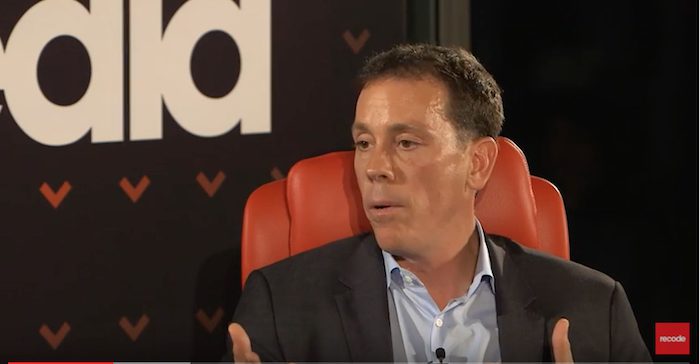
One problem with journalism now: It’s “too damn long,” Jim VandeHei, the cofounder of Politico, told Recode’s Kara Swisher Wednesday night. His new media venture, Axios — set to launch in January, with $10 million already raised — will focus largely on “content you can read on a [single] screen…but when we go deeper…you can trust us that yes, you actually should have done that, because we freed you up, because we made everything else easier.”
VandeHei wouldn’t share many specific details on Axios, citing a “hyper-competitive market,” but said, “Fundamentally, the problem that needs to be solved now — unlike a decade ago — is that there’s more good information than at any point in humanity, but it’s harder than ever to get to, even for really sophisticated readers…To me, the topic areas that cover all those people who care about serious news are: media trends, meaning how are people consuming and disseminating information; politics; business; and technology. All growth, all new ideas, are going to come from the collision of those ideas.”But we’re all trying that, Swisher argued: “Are you gonna do special news that you’re gonna send to people’s neural networks? So what? There’s only so many tricks we all have.”
“When it goes live, I don’t think anybody’s going to be like, with any individual piece, we created a levitation machine,” VandeHei said. “I think, in totality, people will say, ‘This is very different than what I get out there,’ and it comes by how you think about the content…and then getting it to [readers] with a hell of a lot more brevity, and I think when you’ll see it you’ll say that’s a pretty clever way of getting it to people in a brief, really consumable way.”
It’s hard not to dumb things down when you’re writing short, Swisher pointed out.
“I don’t agree with that,” VandeHei said. “Go through The New York Times tomorrow and tell me how many of those stories should have been 800 words…most of those pieces might tell you a new fact, a new thing that you might want to be aware of, and if you made that much more efficient for the reader, then they’d actually have time to spend reading the pieces that actually matter.
“Right now, listen, our minds are being reprogrammed. There’s no debate about that. People are consuming less and less in smaller little bites. They’re getting easily distracted. And we’ve not made it easier for people to get to the content they should be consuming. I think by how we go about it with the people we hire” — one of those people, apparently, is Steve Brill, who published a piece Thursday under Axios’s Medium account — “and how we put it through our platform, and how we work with both Facebook and Snapchat, I think that we’ve figured out a way to help solve that problem.”
VandeHei’s ultimate goal is for half of Axios’s revenue to come from advertising and half to come from subscriptions — very expensive ones. “I’d be very surprised if I got super-intrigued with a subscription that was less than $10,000.” (Separately, VandeHei, who is an advisor to Jessica Lessin’s The Information, told CJR that he believes The Information should be priced higher than its current $400 a year: “There isn’t much difference between $400 and $800. For a mid-range subscription, price is more elastic than people think.”)
For Axios, “I want really high-end information that helps big organizations, big companies, big associations, big groups make better decisions,” VandeHei said. In other words, the product will be partially aimed at either a corporate audience “or some really rich individuals…but that doesn’t mean — just like at Politico, they had really high subscription rates there, but that doesn’t mean you’re not still producing journalism of consequence for a huge audience. It just gives you another way to fund it…I believe very powerfully in the public service of journalism — I just think we have to quit being delusional about what it takes to build a business around that.”
Though VandeHei wasn’t specific about where Facebook and Snapchat will fit in, he made it clear that just because he sees Axios appealing in part to big corporations doesn’t mean it can’t also produce journalism for millennials, who are “not mentally retarded…I feel like when people write for millennials, they think they have to make it stupid because they want to get as much traffic as humanly possible. You don’t have to do that. There’s a huge audience that wants smart content…that doesn’t mean you have to dumb it down and do tricks for clicks.”
The paradox, it appears, is that this audience may be “huge” but it is, by no means, general — it is niche in the sense that not everyone cares about getting real news. (And parsing out the number of people who actually care becomes reminiscent of the discussions over Hillary Clinton’s “basket of deplorables” comment.)
“Everyone’s so hopped up now about fake news, fake news,” he said. “Yes, that’s a problem. But the much bigger problem is…there’s huge swaths of people who don’t even believe real news. It’s not that they’re buying into fake news. It’s that they think you’re full of it when you say, ‘No, this is a verifiable fact’…You and I, all of us, we can’t make people care about information and news. As passionate as we might be about it, I can’t make people care.
“But for those that do, we can make the experience of getting smarter, in what should be nirvana — this should be the golden age of us getting smarter faster, because there’s more good information, we can get it easily, we can do what we want with it. We can help solve that part of it. That audience might be only 20 percent of the population. It might be 30 [percent]. We can argue all day about how big it is. It’s still pretty substantial.”